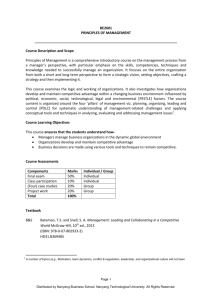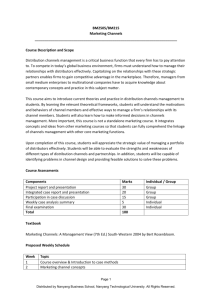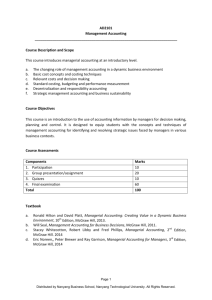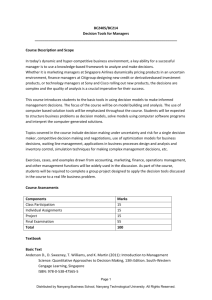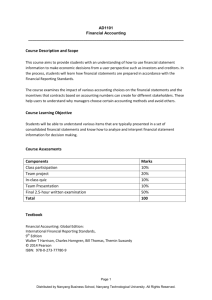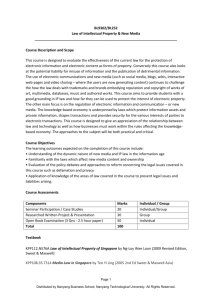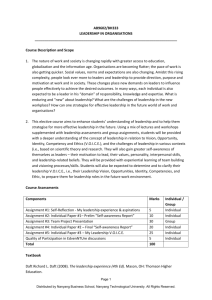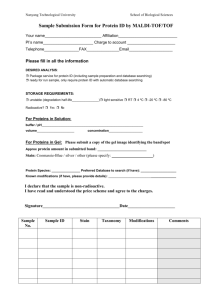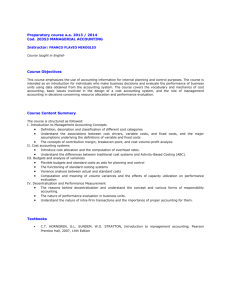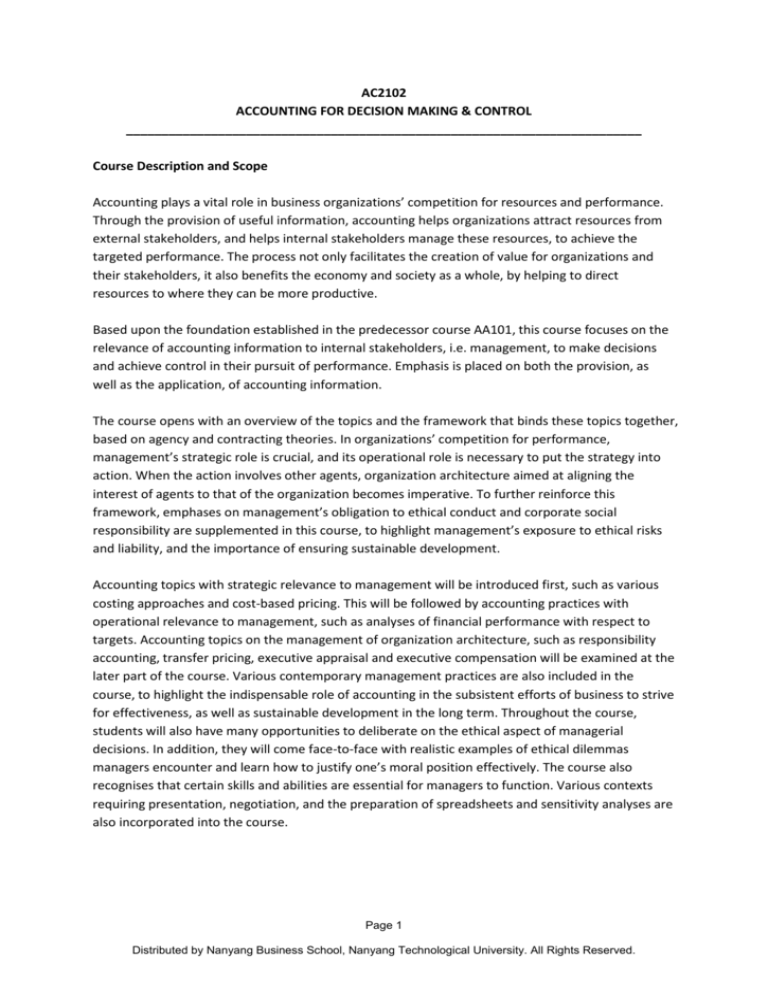
AC2102
ACCOUNTING FOR DECISION MAKING & CONTROL
_________________________________________________________________________
Course Description and Scope
Accounting plays a vital role in business organizations’ competition for resources and performance.
Through the provision of useful information, accounting helps organizations attract resources from
external stakeholders, and helps internal stakeholders manage these resources, to achieve the
targeted performance. The process not only facilitates the creation of value for organizations and
their stakeholders, it also benefits the economy and society as a whole, by helping to direct
resources to where they can be more productive.
Based upon the foundation established in the predecessor course AA101, this course focuses on the
relevance of accounting information to internal stakeholders, i.e. management, to make decisions
and achieve control in their pursuit of performance. Emphasis is placed on both the provision, as
well as the application, of accounting information.
The course opens with an overview of the topics and the framework that binds these topics together,
based on agency and contracting theories. In organizations’ competition for performance,
management’s strategic role is crucial, and its operational role is necessary to put the strategy into
action. When the action involves other agents, organization architecture aimed at aligning the
interest of agents to that of the organization becomes imperative. To further reinforce this
framework, emphases on management’s obligation to ethical conduct and corporate social
responsibility are supplemented in this course, to highlight management’s exposure to ethical risks
and liability, and the importance of ensuring sustainable development.
Accounting topics with strategic relevance to management will be introduced first, such as various
costing approaches and cost-based pricing. This will be followed by accounting practices with
operational relevance to management, such as analyses of financial performance with respect to
targets. Accounting topics on the management of organization architecture, such as responsibility
accounting, transfer pricing, executive appraisal and executive compensation will be examined at the
later part of the course. Various contemporary management practices are also included in the
course, to highlight the indispensable role of accounting in the subsistent efforts of business to strive
for effectiveness, as well as sustainable development in the long term. Throughout the course,
students will also have many opportunities to deliberate on the ethical aspect of managerial
decisions. In addition, they will come face-to-face with realistic examples of ethical dilemmas
managers encounter and learn how to justify one’s moral position effectively. The course also
recognises that certain skills and abilities are essential for managers to function. Various contexts
requiring presentation, negotiation, and the preparation of spreadsheets and sensitivity analyses are
also incorporated into the course.
Page 1
Distributed by Nanyang Business School, Nanyang Technological University. All Rights Reserved.
Course Learning Objectives
This course aims to develop students with comprehensive and in-depth understanding of accounting
practices useful to management, and the ability to integrate and apply this knowledge to address
management concerns on strategic, operational, organization architecture related and ethical issues.
In addition, the course aims to enhance the managerial skills and abilities of students in performing
negotiations, making business presentations, justifying one’s moral stand, and preparing
spreadsheets. On the whole, this course aims to develop students with the capabilities to perform
both the roles of management and accountant.
Course Assessments
Components
Essay
Class Participation
Quiz
Excel Application Test
Management Meeting
Final Examination
Total
Marks
5
10
10
10
15
50
100
Individual / Team
Individual
Individual
Individual
Individual
Team
Individual
Textbook
LTH: Langfield-Smith K., Thorne H. and Hilton R. W., (2009), “Management Accounting”, 5th edition,
McGraw-Hill.
AA202: “Accounting for Decision Making & Control: A Supplementary Text, Semester 1 2011/2012”,
McGraw-Hill, 2011. (This is a customized text and it comprises selected chapters from some of the
reference texts marked with *. There are some changes in the contents as compared to last
semester’s customized text.)
Page 2
Distributed by Nanyang Business School, Nanyang Technological University. All Rights Reserved.
Proposed Weekly Schedule
Week
1
Session
A
2
B
A
B
3
A
B
4
A
B
5
A
B
6
7
A
B
A
B
Topic
Organizational Roles of Accounting and
Management
Organizational Strategy and Cost
Costing of Products and Services: Job Costing
System
Costing of Products and Services: Process
Costing System
Costing of Products and Services: Assigning
Overhead Costs
Costing of Products and Services: Allocating
Support Department Costs
Activity‐Based Costing
Ethical Dilemma and Moral Reasoning
Principles
Standard Costs for Operational Control:
Analysis of Cost Variances
Standard Costs for Operational Control:
Analysis of Sales Variances
Decentralization and Responsibility Accounting
Transfer Pricing
Excel Application Practice
Mid‐Term Assessment
Issue of Management Meeting Instructions
8
9
10
11
12
13
14
RECESS
A
B
A
B
A
B
A
B
A
B
A
B
Performance Evaluation
Incentive Schemes
Excel Application Test
Managing Costs of Quality
Managing Costs of Time
Finalization of Preparation for Management
Meeting
Meeting of Company A Teams
Meeting of Company B Teams
Management Meeting Debrief
Business Sustainability
Course Review
Course Critique
Page 3
Distributed by Nanyang Business School, Nanyang Technological University. All Rights Reserved.


